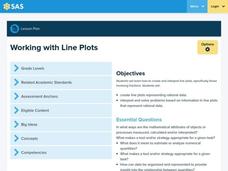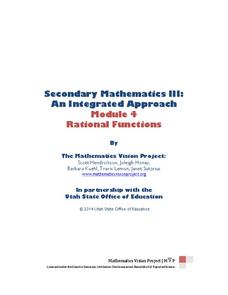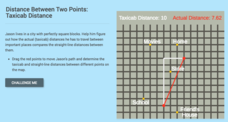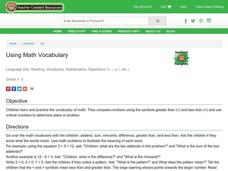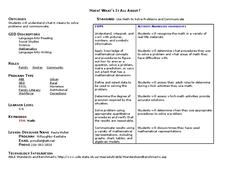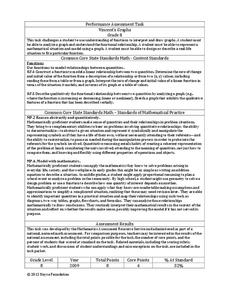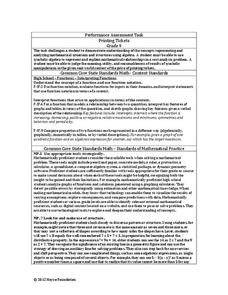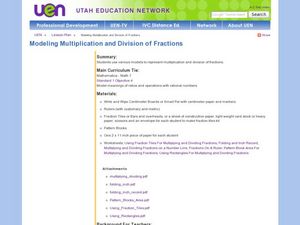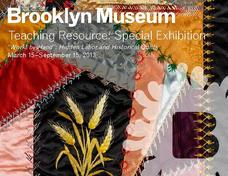Curated OER
Measuring Volume/Capacity Using the Metric System
There is more than one way to measure an amount, as learners discover by applying multiple measurement tools in these activities. Centimeter cubes, cylinders, beakers, and measuring cups are used to find the volume of regular and...
Illustrative Mathematics
Reasoning about Multiplication
In critiquing someone else's theory, learners share insight into their own understanding of mathematical concepts. Fifth graders will explore the notion that products are always larger than their factors. While this statement is...
Curated OER
Five by Two
Help young mathematicians read and interpret numbers from 1 to 10 and sequence them correctly with this card game. Using a deck of cards and two to three classmates, have one player hand out ten cards to each gamer and then put the extra...
Mathematics Vision Project
Module 4: Rational Functions
Time to study the most sensible function — rational functions! The seven-lesson unit develops the concept of a rational function through a connection to rational numbers and fractions. Scholars graph functions, solve equations, and...
CK-12 Foundation
Distance Between Two Points: Taxicab Distance
Apply geometry to find the distance as the crow flies. An engaging lesson compares the distance a car must drive to the straight line distance between two locations. Scholars must manipulate a simulation, note the change in distances,...
CK-12 Foundation
Angle Measurement: Fuel Gauge Angles
Once you start looking, angles appear everywhere in our daily lives. A creative lesson has learners use the angles created by a fuel gauge to practice the Angle Addition Postulate. They see how changing the angle parts does not...
Curated OER
What's Your Symbol?
Sixth graders investigate how colors, objects and geometric shapes have been used symbolically in art during specific time periods. They use this information to create symbolic artwork and write a descriptive/informational piece...
Curated OER
Understanding Symbols
In this symbols worksheet, learners read about how different symbols are used to represent variables or constants in equations. Then students complete 3 problems.
Curated OER
Using Math Vocabulary
Students discover the vocabulary of math. They compare numbers using the symbols greater than (>) and less than (<) and use ordinal numbers to determine place or location. They use worksheets imbedded in this lesson to practice.
Curated OER
Many Times the Same Group
In this multiplication activity, students write words, draw balls, and solve problems multiple times. Students complete 6 sets of problems.
Curated OER
Weaving a Story
It's time to investigate patterns! First and second graders construct a paper weaving using a hundreds chart, then use the Ti-10 calculator to make patterns such as adding 3 each time. Learners remove multiples of three from the hundreds...
Curated OER
Words/symbols Word Search
In this math instructional activity, students locate and identify various vocabulary terms related to basic math. There are five words to locate in the puzzle.
Curated OER
Addition and Subtraction in Center Time
First graders complete center activities as they practice their addition and subtraction skills. They listen to Rick Walton's, "How Many, How Many, How Many" before playing games, and completing addition and subtraction worksheets at...
Curated OER
Party Time
Young scholars explore the cost of a party. In this math lesson, students plan a party and determine the cost of hosting a party. Young scholars use information from grocery stores to determine the unit cost of items for the party.
Curated OER
Math! What's It All About?
Pupils explore math in their everyday lives. In this math lesson, students discuss how they use math in their everyday lives. Pupils work in groups to brainstorm how they use math everyday.
Curated OER
Telling Time Worksheet: Draw Hands on the Clock
In this telling time learning exercise, students look at the times stated underneath each of the 9 clocks and then draw clock hands on each clock to symbolize the correct time.
Inside Mathematics
Vencent's Graphs
I like algebra, but graphing is where I draw the line! Worksheet includes three multiple-part questions on interpreting and drawing line graphs. It focuses on the abstract where neither axis has numbers written in, though both are...
Inside Mathematics
Party
Thirty at the party won't cost any more than twenty-five. The assessment task provides a scenario for the cost of a party where the initial fee covers a given number of guests. The class determines the cost for specific numbers of guests...
Inside Mathematics
Printing Tickets
Determine the better deal. Pupils write the equation for the cost of printing tickets from different printers. They compare the costs graphically and algebraicaly to determine which printer has the best deal based upon the quantity of...
Inside Mathematics
Squares and Circles
It's all about lines when going around. Pupils graph the relationship between the length of a side of a square and its perimeter. Class members explain the origin in context of the side length and perimeter. They compare the graph to the...
EngageNY
Numbers in Exponential Form Raised to a Power
Develop an understanding of the properties of exponents through this series of activities. This third lesson of 15 explores the patterns associated with the power property. Scholars expand the powers before applying the property.
Curated OER
Modeling Multiplication and Division of Fractions
Create models to demonstrate multiplication and division of fractions. Using fraction tiles to model fractions, pupils explore fractions on a ruler and use pattern blocks to multiply and divide. They also create number lines with fractions.
Illustrative Mathematics
Bowling for Numbers
When do teams want a strike? When they are playing this fun math game modeled after bowling. First, class teams roll four dice to generate the numbers they will use in that round, called a frame, of the game. Next, pins numbered 1...
Brooklyn Museum
"Workt by Hand": Hidden Labor and Historical Quilts
Just like a painting or the symbols on a flag, quilts can express ideas that reflect a cultural context, space, and time. The class discusses the history of quilt making throughout US history and what different types of quilts mean. They...
